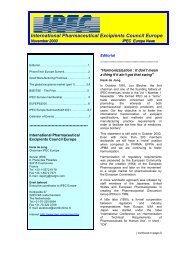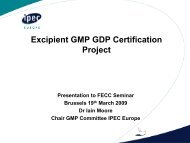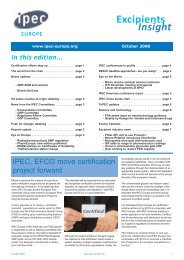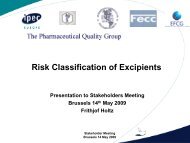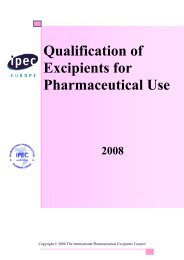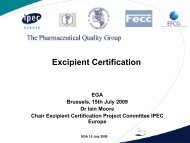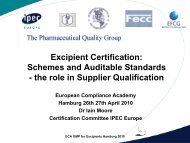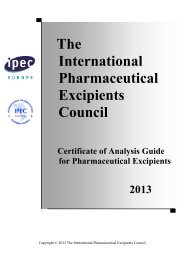0157 ipec opmaak ctp - IPEC Europe
0157 ipec opmaak ctp - IPEC Europe
0157 ipec opmaak ctp - IPEC Europe
You also want an ePaper? Increase the reach of your titles
YUMPU automatically turns print PDFs into web optimized ePapers that Google loves.
July 2004<br />
Editorial<br />
Contents<br />
Editorial ......................................................... 1,2<br />
<strong>IPEC</strong> <strong>Europe</strong> membership 2004 ......................... 2<br />
Internet site update ........................................... 2<br />
Regulatory Intelligence Network ....................... 3<br />
GMO legislation in <strong>Europe</strong> ................................ 3<br />
Good Distribution Practices ............................... 4<br />
Excipient Masterfile system in <strong>Europe</strong> ............. 6,7<br />
Seminar and Annual Meeting 2005 ................... 7<br />
Henk de Jong elected as Vice-Chair of the EP .... 8<br />
Meetings and Congresses ................................. 8<br />
International Pharmaceutical Excipients<br />
Council <strong>Europe</strong><br />
Adrian Bone<br />
Chairman <strong>IPEC</strong> <strong>Europe</strong><br />
Eli Lilly & Company Ltd<br />
Kingsclere Road<br />
Basingstoke<br />
Hampshire RG21 6XA<br />
United Kingdom<br />
Tel +44-1256 401021<br />
Fax +44-1256 401161<br />
E-mail: bone_Adrian_l@lilly.com<br />
Evert Izeboud<br />
Executive coordinator to <strong>IPEC</strong> <strong>Europe</strong><br />
Kerkweide 27<br />
2265 DM Leidschendam<br />
The Netherlands<br />
Tel +31-70-320 9894<br />
Fax +31-70-320 3759<br />
E mail: eizeboud@worldonline.nl<br />
Internet: http://www.<strong>ipec</strong>.org/europe.htm<br />
Time flies by....<br />
This third edition of the <strong>IPEC</strong> <strong>Europe</strong> newsletter in<br />
2004 indicates that already half the year has<br />
gone! Soon holidays will start and there is still so<br />
much to do. But time has not been wasted. The<br />
<strong>IPEC</strong> Committees have been working hard and<br />
progress is evident, many presentations have been<br />
given, position papers written, meetings have<br />
been held with various regulatory bodies to<br />
represent the “Excipient interests” , and much<br />
more. You can find the results of this hard work<br />
in this <strong>IPEC</strong> newsletter which provides an update<br />
on the activities of the GDP and the Regulatory<br />
Network Committees. It gives insight into the<br />
latest developments of EU legislation on<br />
genetically modified organisms and last but not<br />
least, an <strong>IPEC</strong> perspective on the “hot” subject of<br />
the need for a <strong>Europe</strong>an Pharmaceutical Excipient<br />
Master File system.<br />
We are more than happy that also in this edition<br />
we can introduce the company Chr. Hansen.<br />
Getting new members is the lifeline of our<br />
organisation. They further strengthen our position<br />
vis-à-vis the governmental bodies with whom we<br />
interact . A significant and balanced member list<br />
provides an organisation such as <strong>IPEC</strong> with the<br />
credibility it needs. With the ambitious target that<br />
has been set, it is hoped that this new ‘recruit’ will<br />
not be the last one for this year.<br />
A special goal is to find new members located in<br />
the countries recently joining the EU.<br />
Since personal endorsement is still the best<br />
advertisement, the Board would like to ask all of<br />
you to mention <strong>IPEC</strong> at any opportunity you have<br />
in the near future to possible new candidates<br />
from those countries.<br />
(to be continued on page 2)
( Continued from page 1)<br />
The energy that has been put into establishing the<br />
new regulatory network has clearly paid off. The<br />
representatives active in this group have kept<br />
track of new or revised legislation impacting<br />
excipients and are now ready to provide a first<br />
update on the progress that has been made and<br />
providing highlights on significant regulatory<br />
events in this period. With all the changes going<br />
on in the international pharmaceutical environment,<br />
it becomes nearly impossible for a single<br />
excipient supplier to keep track of the all the<br />
developments in the international regulatory field.<br />
With its regulatory network <strong>IPEC</strong> has added a<br />
powerful tool to help its members to stay up-todate<br />
and to safeguard the interest of the Excipient<br />
industry in particular. And as you will read, the<br />
first success is there.<br />
In these busy times it is good to know that<br />
working together within <strong>IPEC</strong> really saves time,<br />
work and avoids sleepless nights. Enjoy the<br />
coming holidays!<br />
Herman Ermens<br />
<strong>IPEC</strong> <strong>Europe</strong> Membership 2004<br />
Recently the Board welcomed the Danish<br />
company Chr. Hansen A/S as a full <strong>IPEC</strong> <strong>Europe</strong><br />
member. The representative of this new member<br />
company is Mr Sven Laulund. Below is a summary<br />
of the membership profile of Chr. Hansen.<br />
Membership Profiles<br />
Chr. Hansen A/S<br />
The company was founded in 1874 by the Danish<br />
pharmacist Christian D.A. Hansen who made a<br />
number of biotechnological discoveries that<br />
revolutionized the production of wholesome dairy<br />
products. Today the company is part of the international<br />
Chr. Hansen Group, which develops,<br />
produces and markets pharmaceuticals, natural<br />
food ingredients, as well as diagnostics for specific<br />
allergic disease management and other product<br />
solutions for human and animal health<br />
The mission of Chr. Hansen is to improve the<br />
quality of food and health for people all over the<br />
world - using effective, well-documented<br />
ingredients, processes and technology.<br />
Chr. Hansen is specialized in developing and<br />
manufacturing excipients for solid dosage forms<br />
(coatings), phytonutrients and probiotics.<br />
Food supplements containing phytonutrients are<br />
a convenient way of enhancing the intake of<br />
essential nutrients normally coming from fruits<br />
and vegetables to maintain good health.<br />
Probiotics may help maintain and restore a<br />
healthy balance of the intestinal flora and may<br />
have a positive influence on immunity.<br />
The New <strong>IPEC</strong> <strong>Europe</strong> Internet site<br />
Evert Izeboud<br />
During the second quarter of 2004, progress was<br />
made in the work progamme of <strong>IPEC</strong> <strong>Europe</strong>’s<br />
Communication Committee. With the assistance<br />
of a professional designer and website builder an<br />
Internet site was set up in conformance with<br />
<strong>IPEC</strong> <strong>Europe</strong>’s new house style. The new site can<br />
be considered as a nice example on what can be<br />
achieved with teamwork.<br />
On 13 July 2004 the public domain of the new<br />
site was “transferred” to the host server of <strong>IPEC</strong><br />
<strong>Europe</strong> at PharmWeb in Manchester (United<br />
Kingdom); the member area and the section<br />
used for publication of the results of Committee<br />
work will move on 23 July 2004.<br />
The task of ‘cleaning’ outdated documents from<br />
the site and finding an appropriate solution for<br />
archiving will be undertaken.<br />
Your coordinator/ webmaster will keep you<br />
updated on further developments.<br />
2
<strong>IPEC</strong> <strong>Europe</strong>’s Regulatory<br />
Intelligence Network (RIN)<br />
Adrian Bone<br />
At the <strong>IPEC</strong> <strong>Europe</strong> Annual Meeting in Cannes at<br />
the start of 2004, the re-launch of this sub-group<br />
was announced and since then on a monthly<br />
basis, contact has been made with ‘regulatory’<br />
representatives of several member companies. The<br />
names can be found in Mr Adrian Bone’s<br />
presentation given during the Annual Meeting in<br />
January 2004 (<strong>IPEC</strong> <strong>Europe</strong> Internet site).<br />
The RIN’s intent is to share with and gather<br />
information on new or revised legislation<br />
impacting pharmaceutical excipients from the<br />
perspective of users, manufacturers and<br />
distributors. Thus we can ensure awareness of<br />
changes and where appropriate seek to influence<br />
requirements to the best advantage of the<br />
Membership.<br />
So, four months later, and hereafter every three<br />
months, it’s time to give the readers of this newsletter<br />
an update on progress and any significant<br />
events. Whilst many items were discussed some<br />
have more indirect impact, affecting activities<br />
which relate to aspects of a manufacturer’s<br />
business other than pharmaceutical excipients.<br />
Hopefully, this information is useful and as always<br />
your feedback on the value of this would be most<br />
appreciated to improve this service.<br />
What is sometimes frustrating is that awareness<br />
comes only when legislation has become<br />
effective...our goal is to try to ensure that we<br />
receive notice of these, if and when they are<br />
issued for consultation, and therefore, we have a<br />
chance to influence their content. The idea is that<br />
when such draft documents are issued, <strong>IPEC</strong><br />
<strong>Europe</strong> will generate a position paper, possibly in<br />
collaboration with other associations, to submit to<br />
the body proposing the new rules etc..<br />
Probably the most notable success this year<br />
concerns the French draft order on GMPs for Raw<br />
Materials for pharmaceutical purposes. Just before<br />
Christmas <strong>IPEC</strong> <strong>Europe</strong> submitted major concerns<br />
on the French draft order Basically this draft<br />
requested full GMP, similar to API’s for all<br />
excipients used in pharmaceuticals in France.<br />
Apparently our comments have been accepted<br />
and the draft has been withdrawn and will be rewritten<br />
to apply only to API’s and certain highrisk<br />
excipients (e.g. gelatin). This brings it in-line<br />
with requirements in the rest of <strong>Europe</strong> and is a<br />
great success!!! The new draft has not yet been<br />
published but the original has been withdrawn.<br />
Many thanks to those who helped to reach this<br />
satisfactory conclusion.<br />
Another significant item to note is that as a result<br />
of the 2001 review of EU pharmaceutical<br />
legislation, that in the case of certain excipients,<br />
there will be an obligation for manufacturers of<br />
medicinal products to use only excipients that<br />
have been manufactured in accordance with<br />
GMP. To which excipients this will apply and<br />
what the GMP requirements will be, have yet to<br />
be defined but will be included in a later<br />
Commission Directive. <strong>IPEC</strong> <strong>Europe</strong> will ensure<br />
that as much assistance as is possible is provided<br />
to the EMEA, referencing the already developed<br />
GMP guidelines for excipients.<br />
Other items that were generated within the<br />
network are more ‘for information’ and have<br />
been distributed to your RIN contact. But again,<br />
please let us have your feedback on what you<br />
would like to know. Also if you would like to be<br />
part of this group or make contributions, you are<br />
most welcome!<br />
Genetically Modified Organisms<br />
EU legislation<br />
For food applications only!<br />
Evert Izeboud<br />
The strictest rules and regulations on GM labelling<br />
in the world are in force in the <strong>Europe</strong>an Union,<br />
extending mandatory labelling requirements to<br />
countless food products in the supermarkets and<br />
resulting in an extensive paper trail for the food<br />
industry.<br />
Under the new rules, all foods which contain or<br />
consist of GMOs or which are produced from<br />
GMOs will have to be labelled regardless of the<br />
presence of GM material in the final product.<br />
(to be continued on page 4)<br />
3
(continued from page 3)<br />
In addition to this obligation, food additives,<br />
which are manufactured with raw materials<br />
derived from GMO, even up to the fifth<br />
generation, have to be considered as GMOderived<br />
and thus within the scope of the GMO<br />
legislation.<br />
A glucose syrup, for example, derived from<br />
starch, that in turn is derived from a GM maize,<br />
will have to be labelled as such. It is evident that<br />
such obligations are going beyond the objective<br />
of the GMO legislation.<br />
The new rules from Brussels - (EC) 1830/2003 on<br />
the Traceability and Labelling of GMOs and (EC)<br />
1829/2003 on Genetically Modified (GM) Food<br />
and Feed - find their source in the right of the<br />
consumer to be adequately informed . The rules<br />
are set up to bring choice to the consumer - if<br />
they see ‘GM ingredient’ on the label they can<br />
decide to buy, or not.<br />
The <strong>Europe</strong>an Commission has been under<br />
intense pressure from the biotech industry and<br />
the US to end the EU’s de facto moratorium on<br />
GMs. The new rules on GM labelling open the<br />
way for an ultimate end to the ban and the<br />
introduction of new GM food crops into the<br />
<strong>Europe</strong>an food chain.<br />
Under the new rules, a threshold of 0.9 per cent<br />
will apply for the accidental presence of GM<br />
material, below which labelling of food or feed is<br />
not required. But for the CIAA, the threshold<br />
versus derivative slant of the law could leave the<br />
door open to confusion for the consumer reading<br />
the label.<br />
While the food industry prepares itself to create a<br />
mountain of paperwork, the start of the chain -<br />
the GM seed industry - must also be in line with<br />
the new rules. While the food industry will have<br />
to label GM food products in <strong>Europe</strong>, in fact food<br />
manufacturers have been reluctant to use GM<br />
ingredients knowing that ultimately it did not<br />
make sound business sense in a climate where the<br />
<strong>Europe</strong>an consumer remains suspicious of<br />
genetically modified foodstuffs.<br />
But it is not just <strong>Europe</strong>an food manufacturers<br />
who will be affected by the new rules. Companies<br />
from the US - where the use of GM ingredients is<br />
much more widespread - are also subject to the<br />
regulations if they wish to do business in the<br />
<strong>Europe</strong>an Union.<br />
Good Distribution Practices<br />
for Excipients<br />
- Current status of international development<br />
and committee activities -<br />
1. International development<br />
Since January 2004 <strong>IPEC</strong> <strong>Europe</strong> Good<br />
Distribution Practice (GDP) Committee has been<br />
working on a guidance document which will be<br />
an interpretation of the Good Trade and<br />
Distribution Practice Guidelines for<br />
Pharmaceutical Starting Materials (GTDP) of the<br />
World Health Organisation (WHO). This WHO<br />
document was published early this year<br />
(http://www.who.int/medicines/strategy/<br />
quality_safety/trs917ann2.pdf). It is defining a<br />
standard which should be applied to the supply<br />
chain for excipients (handling, trading<br />
warehousing, repackaging, transportation etc.) to<br />
ensure full traceability and to prevent<br />
contamination and cross-contamination while<br />
bringing starting materials from original<br />
manufacturers downstream to the end user. It has<br />
been recognised by WHO that a significant<br />
volume of these products are supplied by<br />
distributors to the final user. In November 2003<br />
and May 2004 Frank Milek had meetings in<br />
Stuttgart and Geneva with the responsible people<br />
for GTDP at WHO, namely Sabine Kopp and<br />
Lembit R‰go . WHO has committed to support<br />
this <strong>IPEC</strong> activity and indeed they welcomed the<br />
fact that <strong>IPEC</strong> will provide such a “How-to-do”<br />
document which supports the implementation<br />
and use of WHO GTDP principles by distributors<br />
of excipients. WHO promised to send a key-note<br />
speaker to an <strong>IPEC</strong> launch event where this<br />
document will be presented to industry and<br />
regulatory bodies.<br />
Good practices in the manufacture and supply<br />
chain of pharmaceutical starting materials are<br />
now a key requirement in <strong>Europe</strong>an drug<br />
regulation. Since 1 May the <strong>Europe</strong>an Directive<br />
2004/27/EC is in place. This directive clearly<br />
covers active pharmaceutical ingredients and<br />
certain excipients with GMP requirements:<br />
(to be continued on page 5)<br />
4
(continued from page 4)<br />
Article 46: The holder of a manufacturing<br />
authorization shall at least be obliged:<br />
f) To .... use only active substances employed as<br />
starting materials which have been manufactured<br />
in accordance with detailed guidelines on good<br />
manufacturing practice for starting materials.<br />
This point shall also be applicable to certain<br />
excipients, the list of which and the specific<br />
conditions of application shall be established by<br />
a Directive...<br />
The list of excipients is currently under<br />
construction by <strong>Europe</strong>an legislators where a<br />
group of GMP inspectors from various <strong>Europe</strong>an<br />
countries is working on a proposal for that list. It<br />
is planned to be published by October 2005 at<br />
the latest. These requirements will also be<br />
extended to the activities of distributors of<br />
starting materials as stated in Article 46a of the<br />
directive:<br />
For the purpose of this directive,<br />
manufacture ... shall include ... the various<br />
processes of dividing up, packaging or<br />
presentation prior to its incorporation into a<br />
medicinal product, including repackaging or<br />
relabelling, such as carried out by a distributor of<br />
starting materials,...<br />
Up to now it is not clear which GMP conditions<br />
will have to be applied for the manufacture and<br />
distribution of excipients. Only for active<br />
pharmaceutical excipients have <strong>Europe</strong>an GMP<br />
Guidelines for the manufacture and distribution<br />
been published (Annex 18 of EU GMP<br />
Guidelines). These new requirements in <strong>Europe</strong>an<br />
legislation clearly indicate that <strong>IPEC</strong> activities on<br />
GMP and GDP for excipients are supporting the<br />
effected industries to comply with this regulation<br />
and good practices.<br />
2. Committee activities<br />
<strong>IPEC</strong> <strong>Europe</strong> GDP Committee has already met<br />
three times this year for two day working<br />
sessions in order to draft the GDP Guidelines. In<br />
January the basic format and structure of the<br />
document was discussed and agreed upon with<br />
<strong>IPEC</strong> Americas in a joint meeting in Cannes. In<br />
the meantime, a first complete draft has been<br />
created by the <strong>IPEC</strong> <strong>Europe</strong> GDP Committee and<br />
submitted to <strong>IPEC</strong> Americas for comment. The<br />
scope and structure of the document has been<br />
designed to comply with <strong>IPEC</strong> <strong>Europe</strong> member’s<br />
recommendations which the Committee collected<br />
during 2003. After harmonization of the current<br />
draft with the <strong>IPEC</strong> Americas GMP/GDP<br />
Committee, the <strong>IPEC</strong> <strong>Europe</strong> membership will<br />
again have the opportunity to comment on the<br />
document prior to its official publication.<br />
The document should provide a practical approach<br />
as to how the WHO GTDP principles<br />
should be enacted by distributors of excipients.<br />
For the purpose of the document, “distributors”<br />
includes all parties involved in trade and<br />
distribution, (re)processors, (re)packagers, transport<br />
and warehousing companies, forwarding<br />
agents, brokers, traders, other suppliers than the<br />
original manufacturer, etc. It applies to all steps in<br />
the entire distribution/supply chain starting from<br />
the point at which material is transferred outside<br />
the control of the original manufacturer’s material<br />
management system.<br />
Some sections and/or sub-sections in the document<br />
may not apply to all involved parties. To<br />
help the user to identify the sections applicable to<br />
specific activities there will be a Matrix of<br />
Applicability and detailed table giving the<br />
applicability of each chapter and sub-chapter to<br />
particular supply chain activities. The matrix and<br />
table will differentiate between activities<br />
involving direct contact with excipients and<br />
activities with non-direct contact , reflecting<br />
different levels of risks.<br />
Publication of the document is planned for the<br />
end of 2004 or the beginning of 2005 at an<br />
international launch event together with WHO.<br />
The Committee will then plan and organize a<br />
seminar for interested industries covering the<br />
implication and use of the guide and its detailed<br />
content.<br />
The whole activity is also supported by the<br />
Federation of <strong>Europe</strong>an Chemical Distributors<br />
Associations (FECC). The GMP Committee of<br />
FECC also supports WHO GTDP principles and is<br />
committed to use the upcoming <strong>IPEC</strong> document<br />
to work on GDPs with their <strong>Europe</strong>an member<br />
companies. Frank Milek gave a presentation at<br />
the annual congress of FECC in June 2004 on<br />
GDP aspects of excipient supply chain and <strong>IPEC</strong><br />
activities. At that congress Olivier Gross from<br />
WHO presented WHO GTDP guidelines.<br />
(to be continued on page 6)<br />
5
(continued from page 5)<br />
FECC GMP Committee committed to contribute<br />
to <strong>IPEC</strong>’s launch date and seminar on Good<br />
Distribution Practices for excipients. FECC<br />
estimated that the majority of their member<br />
companies are delivering excipients to the<br />
pharmaceutical industry and therefore are<br />
involved in the new <strong>Europe</strong>an regulations and<br />
these supply chain safety issues. <strong>IPEC</strong> <strong>Europe</strong> GDP<br />
Committee will keep close contact with FECC<br />
(www.fecc.org).<br />
Meanwhile, CEFIC published a new revision of its<br />
GDP Guidelines for Propylene Glycol EP/USP<br />
which can be accessed via the internet: http://<br />
www.landmarks.be/clients/propylene/en/. This<br />
document is also helpful for <strong>IPEC</strong> members<br />
involved in the manufacture, distribution and use<br />
of that particular excipient.<br />
July 2004, <strong>IPEC</strong> <strong>Europe</strong> GDP Committee<br />
Frank Milek,Hedinger GmbH & Co. KG -<br />
Chairman (Email: fmilek@hedinger.de)<br />
Mathias Brenken<br />
Reiner Gellrich<br />
George Mansveld<br />
Alexander Schoch<br />
Tanja Twiehaus<br />
Allan Whiston<br />
Dow Deutschland<br />
GmbH & Co. OHG<br />
Cognis<br />
Hercules Aqualon<br />
Palatinit GmbH<br />
Merck KGaA<br />
Aventis<br />
The Case for a Pharmaceutical Excipient<br />
Masterfile (EMF) System in <strong>Europe</strong><br />
Michael Gross<br />
Henk de Jong<br />
Adrian Bone<br />
The EMEA Guideline on Active Substance Master<br />
File Procedure becomes effective on 31 August<br />
2004 and addresses Master Files for active<br />
pharmaceutical ingredient (ASMF). It provides a<br />
mechanism for protecting confidential intellectual<br />
property and ‘know-how’ belonging to an API<br />
manufacturer allowing the Applicant/Marketing<br />
Authorization holder to take full responsibility for<br />
the medicinal product and the quality of and<br />
quality control of the active substance (API). This<br />
is achieved through a two-part Master File divided<br />
into an Applicant’s (or Open) Part containing<br />
non-confidential information and a Restricted (or<br />
Closed) Part, which contains proprietary details<br />
shared directly with a Competent Authority. If,<br />
during review of the Application, the Competent<br />
Authority determines that in order to effectively<br />
control the quality of the API, the Applicant/<br />
Marketing Authorization holder needs access to<br />
information contained in the Restricted Part, the<br />
Competent Authority may request that an<br />
amendment to the Applicant’s Part is filed by the<br />
API manufacturer.<br />
Establishing a similar Master File system for<br />
excipients in <strong>Europe</strong> would provide an important<br />
vehicle for manufacturers of pharmaceutical,<br />
especially novel excipients to submit information<br />
to regulatory authorities on pharmaceutical<br />
excipients in support of applications for Marketing<br />
Authorization submitted by their customers.<br />
<strong>IPEC</strong> <strong>Europe</strong> is proposing that the Master File<br />
system in <strong>Europe</strong> is extended to pharmaceutical<br />
excipients. There is precedence for this: in the<br />
past the <strong>Europe</strong>an Commission allowed the<br />
equivalent of Master Files for excipients to be<br />
submitted when it became necessary to replace<br />
CFC propellants with HFA propellants (norflurane<br />
or HFA-134a) in metered dose inhaler products.<br />
Looking at EMF’s globally, the (US) FDA’s DMF<br />
system includes Type IV Drug Master Files for<br />
Pharmaceutical Excipients where all submitted<br />
information is treated as confidential and there is<br />
no “open” Applicants Part. In Japan, a Drug<br />
Master File system is being constructed, and it<br />
will include active ingredients and novel<br />
excipients. The system should become<br />
operational in 2005. Current <strong>Europe</strong>an legislation<br />
distinguishes between API and excipient<br />
manufacturers in that the ASMF system protects<br />
intellectual property concerning the manufacture<br />
and control data for APIs but not for<br />
excipients.[Note: The Treaty of Rome requires<br />
that all groups of manufacturers are treated<br />
equally.]<br />
Efforts to develop new formulations to improve<br />
manufacturability, stability or drug delivery is<br />
dependent upon innovation in the development<br />
and manufacture of pharmaceutical excipients.<br />
However, the lack of protection of intellectual<br />
property of new and novel pharmaceutical<br />
excipients discourages this.<br />
(to be continued on page 7)<br />
6
(continued from page 6)<br />
Medicinal products formulated with novel<br />
excipients are more likely to undergo centralized<br />
assessment by regulatory authorities and may<br />
require more comprehensive information in their<br />
applications. Greater detail on development,<br />
manufacturing methods and quality assessment is<br />
needed for new excipients and if used for the first<br />
time in a medicinal product or by a new means of<br />
administration, clinical and preclinical information<br />
are also required.<br />
To encourage the development of novel<br />
excipients, innovative technologies and ‘knowhow’<br />
must be protected. The pharmaceutical<br />
market for excipients is small compared to that for<br />
food additives and there needs to be adequate<br />
protection of proprietary information as otherwise<br />
they will not be economic to develop and produce.<br />
The extension of the EDMF procedure to include<br />
pharmaceutical excipients would provide a suitable<br />
and efficient way for relevant information to be<br />
made available to authorities as it would enable<br />
the presentation of complete and pertinent<br />
information in a single dossier and facilitate a<br />
comprehensive and consolidated assessment of<br />
the novel excipient product. It would eliminate the<br />
need for excipient manufacturers to re-submit the<br />
same documentation for the review of each<br />
marketing authorisation from multiple end-users<br />
of the same excipient and serve to protect the<br />
intellectual property of developers of new<br />
excipients. This also achieves a degree of<br />
harmonization with developers of APIs in <strong>Europe</strong><br />
and manufacturers of excipients in the United<br />
States and (soon) in Japan.<br />
Your comments, ideas and support for this<br />
proposal would be most welcome. We<br />
look forward to hearing from you: please<br />
contact <strong>IPEC</strong> <strong>Europe</strong> as follows:<br />
Adrian Bone<br />
Chair, <strong>IPEC</strong> <strong>Europe</strong><br />
bone_adrian_l@lilly.com<br />
+44(0)1256 401021<br />
Henk de Jong<br />
Vice Chair, <strong>IPEC</strong> <strong>Europe</strong><br />
hendrik.dejong@fr.netgrs.com<br />
+33-1-5572 6178<br />
Evert Izeboud<br />
Executive coordinator to <strong>IPEC</strong> <strong>Europe</strong><br />
eizeboud@worldonline.nl<br />
+31-70-3209894<br />
Seminar and AGM 2005<br />
Following the highly appreciated January event<br />
the Board has decided to organise the January<br />
2005 Seminar at the same venue.<br />
<strong>IPEC</strong> <strong>Europe</strong> members are requested to<br />
reserve the dates of 27 and 28 January, 2005<br />
in their diaries.<br />
The EDQM’s Certificate of Suitability system for<br />
excipients having a monograph in the <strong>Europe</strong>an<br />
Pharmacopoeia is similar to a DMF, and highly<br />
useful for well-known ingredients. However, it is<br />
not open to biotech products and novel<br />
ingredients.<br />
<strong>IPEC</strong> <strong>Europe</strong> is seeking support to promote the<br />
idea of a <strong>Europe</strong>an Masterfile system applicable<br />
to excipients not in the scope of the EDQM<br />
certification scheme. We are doing this to<br />
stimulate innovation (in formulation science/drug<br />
delivery) and international harmonization.<br />
Majestic Hotel, Cannes, France<br />
7
Mr Henk de Jong elected as Vice Chair of<br />
the <strong>Europe</strong>an Pharmacopoeia Commission<br />
Calendar of events 2004<br />
It is a pleasure to announce that Professor Henk<br />
de Jong, Vice Chair of <strong>IPEC</strong> <strong>Europe</strong>, has recently<br />
been elected 1 st Vice-chair of the <strong>Europe</strong>an<br />
Pharmacopoeia Commission for the period<br />
2004-2007.<br />
The Presidium consists further of the Chair: Dr<br />
Mike Morris (Irish Medicines Board, Dublin)<br />
and the 2 nd Vice-chair Mrs. Hilda Köszegi-Szalai<br />
(OGYI, the Hungarian agency for medicines,<br />
Budapest).<br />
The <strong>IPEC</strong> <strong>Europe</strong> Board would like to congratulate<br />
Professor Henk de Jong on this very important<br />
appointment which will undoubtedly strengthen<br />
the constructive working relationship which exists<br />
with the <strong>Europe</strong>an Pharmacopoeia.<br />
Date<br />
July 15<br />
September 20<br />
October 4-6<br />
October<br />
November 17<br />
November 18<br />
Event<br />
Board Meeting<br />
Paris, France<br />
Harmonisation Cie<br />
Geneve, Switzerland<br />
Quality on the move<br />
EDQM Symposium<br />
Budapest, Hungary<br />
Board meeting<br />
Paris, France<br />
Tri-PEC Meeting<br />
PDG/Tri-Pec Meeting<br />
EDQM Conference<br />
Quality on the Move,<br />
Dynamics of the <strong>Europe</strong>an Pharmacopoeia<br />
From 4-6 October 2004, the <strong>Europe</strong>an Directorate<br />
for the Quality of Medicines (EDQM) will organise<br />
an International Conference with contributions<br />
from <strong>IPEC</strong> (Dr Undine Kettenring, Dr Chris Moreton<br />
and Prof. Henk de Jong). The venue of the<br />
conference is Budapest (Hungary).<br />
<strong>IPEC</strong> <strong>Europe</strong> will further organise a promotional<br />
programme including a display and cocktail hour.<br />
The programme, including registration forms for<br />
the conference and accommodation can be<br />
downloaded from the website of the EDQM.<br />
December 7-9 CPhI 2004<br />
Brussels, Belgium<br />
************************************<br />
Next <strong>IPEC</strong> <strong>Europe</strong> Newsletter<br />
The next Newsletter is scheduled to be<br />
issued in the month of October 2004.<br />
Call for text to be published<br />
<strong>IPEC</strong> <strong>Europe</strong> members who would like to<br />
contribute to the Newsletter are invited to<br />
submit text electronically (maximum 1 A4)<br />
to Mr Izeboud.<br />
EDQM site address:<br />
www.pheur.org<br />
<strong>IPEC</strong> <strong>Europe</strong> on the Internet<br />
http://www.<strong>ipec</strong>.org/europe.htm<br />
8



